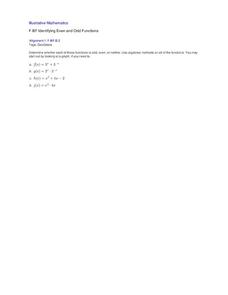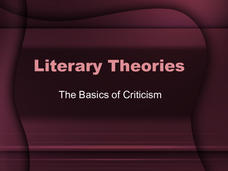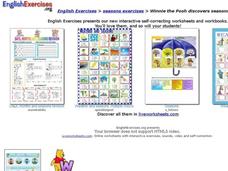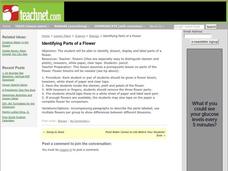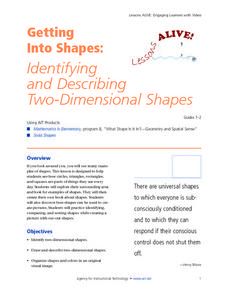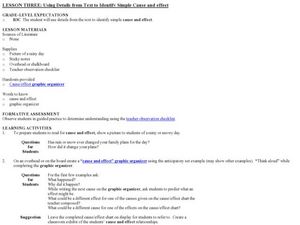Curated OER
Vocabulary Instruction: Identify and Sort Common Words into Categories
Kids learn about the concept of nouns. They practice identifying nouns by sorting words into categories. As the teacher holds up each word, the class reads it in unison, then they take turns identifying it as a noun or non noun word....
Illustrative Mathematics
Identifying Even and Odd Functions
Use a worksheet to give learners practice in identifying even and odd functions. The problems on this page are also appropriate for use as assessment items, or you can use them with GeoGebra to interactively present concepts. The task is...
Polk Bros Foundation
I Can Identify a Nonfiction Writer's Main Idea and Supporting Examples
Use this page to quickly identify the central idea of a text and organize ideas for writing an informational or explanatory text. The worksheet is split into two parts. In the first part, pupils note down the main idea and supporting...
Curated OER
Identifying Birds (Anticipation Guide)
Middle schoolers are introduced to Ecology Explorers and identify common birds at their location. They start with an anticipation guide and continue with Bird identification cards.
Curated OER
Identifying Three-Dimensional Figures (2)
For this three dimensional figures review worksheet, students use their math skills to identify the 10 three dimensional figures pictured on the sheet.
Curated OER
Jabberwocky-Identifying Adjectives
Elementary learners identify adjectives in sentences. They read the poem "Jabberwocky" by Lewis Carroll and highlight the adjectives. A good supplemental lesson if you are studying Lewis Carroll and/or "Jabberwocky."
Curated OER
Identify Figurative Language
Your class can identify idioms, metaphosr, similes, hyperboles or personification by reading poetry and interpret meaning.
English Enhanced Scope and Sequence
Identifying Persuasion in Media Literacy
As part of a study of media literacy, groups examine advertisements from Money, Fortune, The New Yorker, or Good Housekeeping and identify the types of rhetorical appeals used in the ads. After groups present their findings, the whole...
American Chemical Society
Using Dissolving to Identify an Unknown
There is a solvent called aqua regis that can dissolve gold! After observing a solubility demonstration, groups receive four known crystals and one unknown. Based on the demo, they design an experiment to determine the identity of the...
Scholastic
The -ad Family
You'll be so glad to have had this rad instructional activity for your youngsters to practice identifying what words belong to the -ad family!
K12 Reader
Identifying Adverbs III
Put young grammarians to the test with an activity about adverbs. A five-paragraph passage prompts kids to find the adverbs and circle them, noting their purpose in context.
National Woman's History Museum
Creating a Historical Thesis Statement
A strong thesis statement not only identifies the subject of an essay but also presents a claim that must be supported with evidence. After researching how nursing has evolved in the United States since the Colonial era, young writers...
Livaudais-Baker English Classroom
Literary Theories
Introduce ELA scholars to the basics of literary criticism with a 41-slide presentation that identifies eight different approaches to critical analysis. Each approach is defined, and advantages and disadvantages are listed. Also included...
Curated OER
Identifying Linear Functions from Graphs
Keep your mathematicians engaged using this group linear functions activity. Each of ten groups receives two graphs with both an image and equation, as well as a "who has" phrase to call out the next graph. Scholars stay on their toes as...
Waunakee Community School District
Identifying Themes in Literature
If your language arts learners have a hard time determining the universal theme of a written work, use a straightforward worksheet to help them find it. After reviewing a list of common themes, kids note the title, character, plot, point...
Curated OER
Winnie the Pooh discovers seasons
Here is a charming worksheet on the seasons. Young learners watch a video about Winnie the Pooh and seasons which is embedded in the worksheet. They read sentences, fill in the blanks, and identify seasons based on the Winnie the Pooh...
Curated OER
Identifying Parts of a Flower
Students identify, dissect, display and label parts of a flower. They dissect lilies and label each part as they tape it to a white sheet of paper.
Curated OER
Identify Time Signatures
In this identify time signatures activity, student determine the correct meter signature for each of 8 lines of music when they identify the correct answers by circling them
Curated OER
Identify Different Types of Triangles
In this geometry worksheet, students identify different kinds of triangles. Students are given four triangles with their measurements and are to determine which triangle it is by choosing from six different kinds.
Curated OER
Identifying Components of Algebraic Expressions
Use this lesson in your algebra class to help high schoolers identify the coefficient in a variable expression. After the do this, they identify the constant in an expression, identify an algebraic term, and identify an algebraic...
Curated OER
Identifying Noun Clauses Worksheet
In this identifying noun clauses worksheet, students identify the type of noun clause in each sentence. Students decide if the clause is a direct object, indirect object, object of the preposition, predicate nominative, subject or...
Curated OER
Identifying Story Elements
Help your class identify story elements. They will discuss character, setting, problem, and solution after reading a story. A graphic organizer will help them to identify various elements with guided practice and independent practice...
Curated OER
Getting Into Shapes: Identifying and Describing Two-Dimensional Shapes
Young scholars examine their classroom to find examples of various types of shapes. After identifying and describing the various shapes, they draw as many as they can on a piece of paper. They organize them into an image based on their...
Curated OER
Lesson Three: Using Details from Text to Identify Simple Cause and Effect
Third graders identify cause and effect. In this cause and effect instructional activity, 3rd graders use a graphic organizer to predict effects for certain causes. They read a non-fiction text and put sticky notes marking causes and...
Other popular searches
- Identifying Context Clues
- Identifying the Main Idea
- Identifying Main Ideas
- Identifying Parts of Speech
- Identifying Nouns
- Identifying Point of View
- Identifying Topic Sentences
- Identifying Mood
- Identifying Parts of Plants
- Identifying Author's Purpose
- Identifying Authors Purpose
- Identifying Emotions



